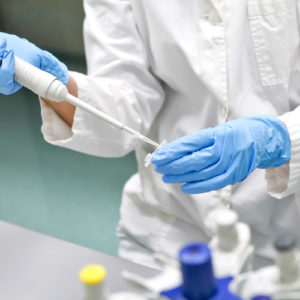
Cancer Guardian provides preventative strategies by helping you to understand your genetic risk of cancer with the Hereditary Cancer Risk Screening Test. If you are diagnosed with cancer, fully-funded access to Comprehensive Genomic Profiling can help your doctor identify the most effective treatment options.
The Hereditary Cancer Risk Screening Test analyzes 61 genes for clinically informative mutations associated with hereditary cancers including, but not limited to:
- Breast
- Colorectal
- Melanoma
- Gastric
- Ovarian
- Pancreatic
- Prostate
- Renal
- Thyroid
- Uterine
Every test includes a one-on-one call with a genetic counselor, who will help to interpret the genetic test results and help you to understand any implications on your health. Additionally, Cancer Guardian provides access to the Family Follow-up Testing Program which provides free testing for first-degree blood relatives, if a positive finding is reported to determine if they also have an increased cancer risk (includes children age 18 years or older). The Cancer Information Line, staffed by oncology experts, provide actionable steps and work with your primary care provider to incorporate the information into your regular health care.
Direct-to-Consumer (DTC) genetic testing, like that offered by 23andMe, is limited and reports primarily traits and ancestry. In contrast, the Cancer Guardian program is focused on cancer and is significantly more comprehensive than DTC testing by targeting a large panel of clinically relevant mutations associated with cancer. It is a physician ordered test and is performed by an independent certified clinical laboratory.
Comprehensive Genomic Profiling (GCP) is one of the most advanced approaches to helping guide cancer treatment for patients, but it is typically the most difficult to access with traditional health systems. Cancer Guardian makes this fully funded test available to all members diagnosed with cancer. Cancer Guardian’s GCP interrogates more than 300 cancer-related genes in the tumor. This comprehensive test can help guide oncologists to determining targeted treatments and immunotherapies for better outcomes.
Any Cancer Guardian member diagnosed with cancer will be assigned a dedicated Cancer Support Specialist (CSS), who is an experienced oncology professional. The CSS will be there every step of the way to facilitate a range of services and deploy additional post-diagnosis support programs, including providing information to the treating physician. Additionally, an On-Site Nurse Advocate can accompany patients to a physician/hospital appointment (1 time) to provide support, guidance and document essential information.
References
1. Lifetime Risk of Developing or Dying from Cancer Basic Facts. American Cancer Society, 2019.
2. Wamberg Genomic Advisors, Cancer Survey of 204 cancer patients and nonprofessional advocates. Survey Sampling International (SSI), 2018.
3. Unger, Joseph M., et al. Systematic Review and Meta-Analysis of the Magnitude of Structural, Clinical and Physician and Patient Barriers to Cancer Clinical Trial Participation. JNCI J NATL Cancer Institute, 2019.
4. Family Reach. Annual Report 2016. Family Reach Foundation https://familyreachorg/wp-content/uploads/
2017/05/ frf_2016_annual_report_compressedpdf Accessed July 30, 2017.
5. CancerCare. Cancer Care Patient Access and Engagement Report. New York: CancerCare. 2016.
6. Manchanda, Ranjit, et al. Population based germline testing for primary cancer prevention. Oncotarget, 2018, Vol. 9 (No. 69), pp: 33062-33063
7. Waszak, Przemyslaw M. et al. The Spread of Medical Fake News in Social Media. Health Policy & Technology Review, Elsevier, 2018.
8. Stephen S. Raab, Dana M. Grzybicki, CA Cancer J. Clin. 2010 May-Jun,60(3): 139-65
9. Raab, Stephen S. MD, et al. Quality in Cancer Diagnosis. Cancer J. Clinical 2010
10. J. Unger, et al., Systematic Review and Meta-Analysis of the Magnitude of Structural, Clinical and Physician Barriers to Cancer Clinical Trial Participation, JNCI J Natl Cancer Inst 2019
11. The State of Cancer Care in America, 2014: A report by the American Society of Clinical Oncology. Journal of Oncology Practice, 2014; 10(2):120-122
12. Sun Life Stop-Loss Report, 2019. https://sunlife.showpad.com/share/
7SzmNmJJs1a6msorM0DZA
14. Measuring Health-Related Productivity Loss. https://ww.liebertpubl.com/doi/pdf/10.3322/caac.20068.
16. Wamberg Genomic Advisors Cancer Survey of 204 cancer patients and nonprofessional advocates fielded by Survey Sampling International (SSI), 2018. Available at: https://www.managedhealthcareexecutive.com/leukemia-and-lymphoma/
most-troubling-part-cancer-treatment-patients
